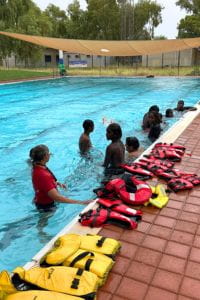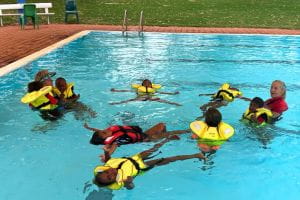Wet season water safety in Jigalong Community
In the remote Pilbara, water doesn’t flow year-round— but when it rains, it pours. In preparation for the wet season, 45 children from the remote Aboriginal community of Jigalong took part in an inland water safety program last summer delivered by Royal Life Saving WA instructor Deb Gill.

The sessions were held at the Royal Life Saving WA’s Remote Pool in Jigalong and focused on teaching kids to recognise hazards and stay safe around creeks, rivers and floodwaters.
Children learned how to float on their backs with their feet up, a method that helps avoid hidden obstacles like tree roots or sudden drop-offs. They also practised sculling, treading water and using lifejackets, along with ways to rescue others using everyday items.

The program included discussions about dangers specific to the area. Snake holes along the banks, shifting ground, and collapsed burrows all pose a risk, especially after heavy rainfall. Many children were already familiar with local wildlife, including pythons, and the sessions helped reinforce safe behaviours around the water’s edge.
These lessons are crucial in remote Aboriginal communities, where help can be far away and waterways can rise fast after heavy rain or cyclones. Tragically, Aboriginal Australians were nearly five times more likely to drown in inland waterways than non-Indigenous Australians in 2022-23.
By offering education on the risks and dangers associated with inland waterways, the Inland Communities Water Safety Program is helping children across WA stay safer in and around water.
This program has been delivered by with the support of the Royal Life Saving Society Australia and the Australian Government.